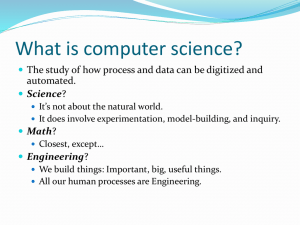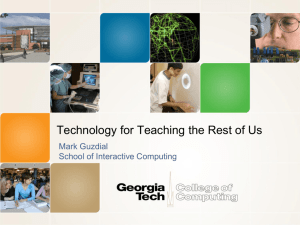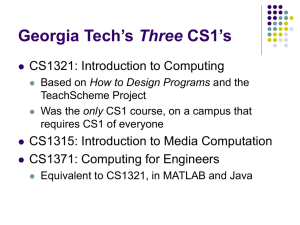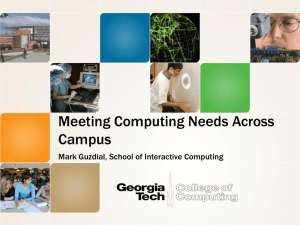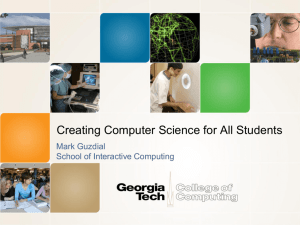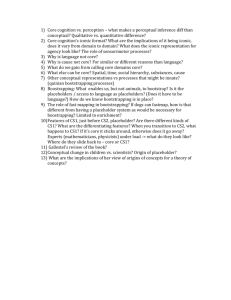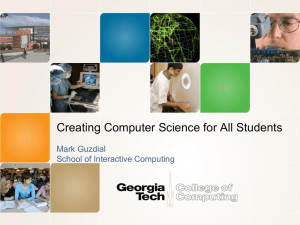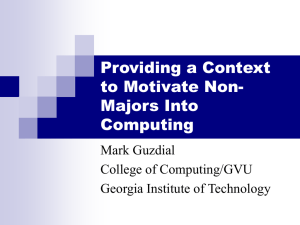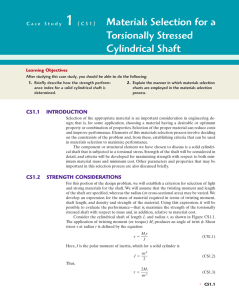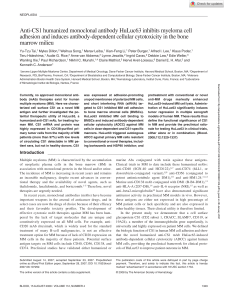A CS1 Course Designed to Address Interests of Women Lauren Rich¹*, Heather Perry,
advertisement
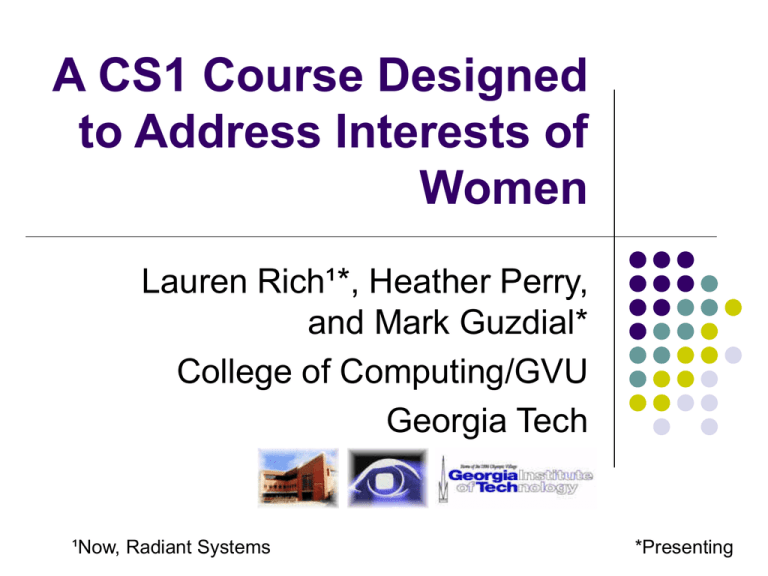
A CS1 Course Designed to Address Interests of Women Lauren Rich¹*, Heather Perry, and Mark Guzdial* College of Computing/GVU Georgia Tech ¹Now, Radiant Systems *Presenting Computer Science Education is Facing Challenging Times Nationally Women and minority percentage of enrollment dropping High failure rates in CS1 (35-50% or more) Fewer applications into CS “All programming jobs going overseas” Research results: “Tedious,” “boring,” “lacking creativity,” “asocial” At a time when we recognize the critical role of IT in our economy, in all jobs CS1315 Introduction to Media Computation Focus: Learning programming and CS concepts within the context of media manipulation and creation Converting images to grayscale and negatives, splicing and reversing sounds, writing programs to generate HTML, creating movies out of Web-accessed content. Computing for communications, not calculation Required course at Georgia Tech for Architecture, Management, and Liberal Arts students; Optional for Biology 121 students in Spring 2003, 303 in Fall ’03, and 395 for Spring ‘04 2/3 female in Spring 2003 MediaComp Key Design Goals Relevance Creative: To counter the “boring” claim Focus on communications Used open-ended assignments, like visual and audio collages. Collaboration: To counter the “asocial” stereotype Most assignments were collaborative, Used an on-line space to create a social context (e.g., students encouraged to post and share collages in “Galleries”) Restricted registration to reduce intimidation Rough overview of Syllabus Defining and executing functions Pictures Sounds Psychophysics, data structures, defining functions, for loops, if conditionals Sampled sounds vs. synthesized, MP3 vs. MIDI Text Psychophysics, data structures, defining functions, for loops, if conditionals Bitmap vs. vector notations Converting between media, generating HTML, database, and networking A little trees (directories) and hash tables (database) Movies Then, Computer Science topics (last 1/3 class) Computer Science Topics as solutions to their problems “Why is PhotoShop so much faster?” “Writing programs is hard! Are there ways to make it easier? Or at least shorter?” Compiling vs. interpreting Machine language and how the computer works Object-oriented programming Functional programming and recursion “Movie-manipulating programs take a long time to execute. Why? How fast/slow can programs be?” Algorithmic complexity Evaluation Questions Does the class address the failure/drop rates that originally motivated the project? Are we meeting the stated design goals to address…? Relevance Creativity Social context Registration data being used here. Interview and Survey data being used here. Interviews were done in both MediaComp and Traditional CS1. Does the class work to address failure/drop rates? In Spring 2003, 121 students (2/3 female), 3 drops 60% of students surveyed at end of Sp2003 course say that they want a second course. Fall 2003, 303 students, 8 drops Spring 2004, 395 students, 19 drops These are non-majors, who have already fulfilled their requirement We are getting transfers into the CS major. Success Rate Average GT’s CS1 72.2% (2000-2002) Media Computation Spring 2003 Media Computation Fall 2003 88.5% 87.5% Were Students Motivated and Engaged? Q. What do you like best about this course? Survey responses (Sp03) suggest that students responded well to the context of media manipulation and creation. Course Don't like it/Nothing Enjoy Content Content is Useful Trad. CS1 18.2% 12.1% 0.0% Engin 12.9% 16.1% 25.8% Media Comp 0.0% 21.3% 12.4% Interviews with MediaComp students: Is the class ‘boring’? Q: What is the most surprising, or interesting thing you've learned? Student 3: That it's fun. I know that's not specific. Q: ``It'' being CS, or programming, or what? Student 3: Both. The history of the computer and the Web. And that programming is not scary, it is actually pretty cool and when you make a program that actually runs it's a really good feeling. I didn't expect to enjoy it at all because all I'd heard were just the bad stories… Student (on Survey): I dreaded CS, but all of the topics thus far have been applicable to my future career and personal plans. There isn't anything I don't like about this class! Creating a social context Q: Did you ever feel intimidated by anyone in the class? Student 3: Nope. I think it's really good that we don't have a lot of CS majors in the class. Because if we did, I would feel very intimidated because I wouldn't know everything that they know. Student 3: Actually, I think that [collaboration] is one of the best things about this class. My roommate and I abided by all the rules, and we didn't collaborate on anything we weren't supposed to even though we live like 5 feet away from each other. I don't think that this class would have been as much fun if I wasn't able to collaborate. Role of the Homework “Galleries” Q: What do you think about the homework galleries on theCoWeb? Student 4: It's nice to see other people, like what they did with it… And there is no better feeling than getting something done and knowing that you've done it right. Student 3: I don't ever look at it [the homework gallery] until after I'm done. I have a thing about not wanting to copy someone else's ideas. I just wish I had more time to play around with that and make neat effects. But JES [Jython Environment forStudents--the programming environment created for this class] will be on my computer forever, so…the nice thing about this class is that you could go as deep into the homework as you wanted. So, I'd turn it [the homework assignment] in, and then me and my roommate would do more after to see what we could do with it. Interviews with Traditional CS1 Students: Is it ‘boring’? Q: Is CS fun? Student 1: Yeah…Like I never thought that I would enjoy sitting here at 11 at night doing Scheme programs but you get to see people and you bond, and we order pizza. It's better than constantly working with numbers and math, physics… Student 3: Well, I wouldn't do it on the weekends. It's like doing a crossword puzzle or something, so it's good for a class. Is it useful? Student 1: I don't know yet. Some of the examples that we've done you can see how you can apply the concepts to real life. Like there was an example with seeing how when you make a deposit in the bank it finds the balance, you can see how that's related to real life, but I don't know if you can do that with Scheme. Is it relevant? Q: Is CS relevant to your career and/or personal life? Student 3: Maybe, I'm not sure yet. I don't know about my personal life, but I guess if I want to be a doctor later, yeah, the skills I learned will be important, like logical thinking. Student 1: I still don't know about how it will apply to my career. Personal? Right. Like, I just got back from lunch with (my friend), and he suggested that we could decide where to go to eat by making up lists of restaurants. Right. (Laughs) Summary CS Education is challenged today to be more relevant and inclusive. We developed the Introduction to Media Computation to respond to concerns about relevance, creativity, and social context. Interviews with women in MediaComp and our traditional CS1 suggest that the course is leading to changes in attitudes. Our thanks to our collaborator Heather Perry and for support from the National Science Foundation, College of Computing’s Undergrad Research Opportunities Program, and Georgia Tech’s President’s Undergraduate Research Awards program Were Students Motivated and Engaged? Homework assignments suggest they were. Shared on-line in collaborative web space (CoWeb) Some students reported writing programs outside of class for fun. Were Students Motivated and Engaged? Were Students Motivated and Engaged? Soup Stephen Hawking Latest: Spring 2004 “Well, I looked at last years’ collages, and I certainly can’t be beat.”
